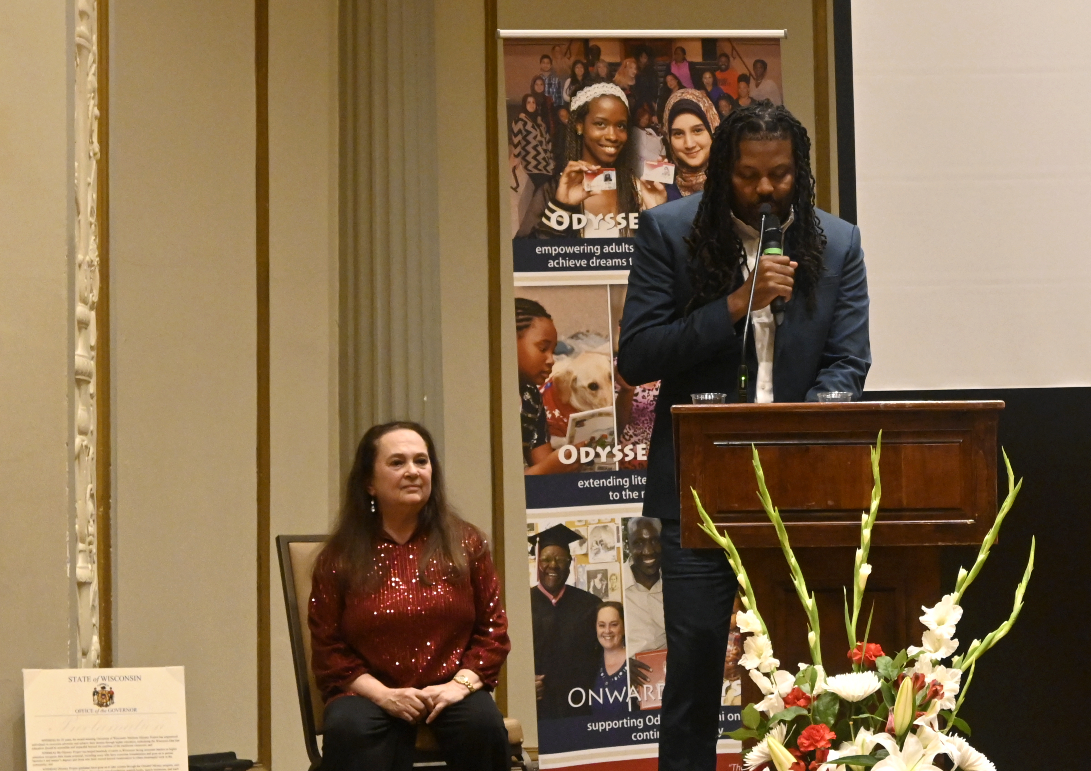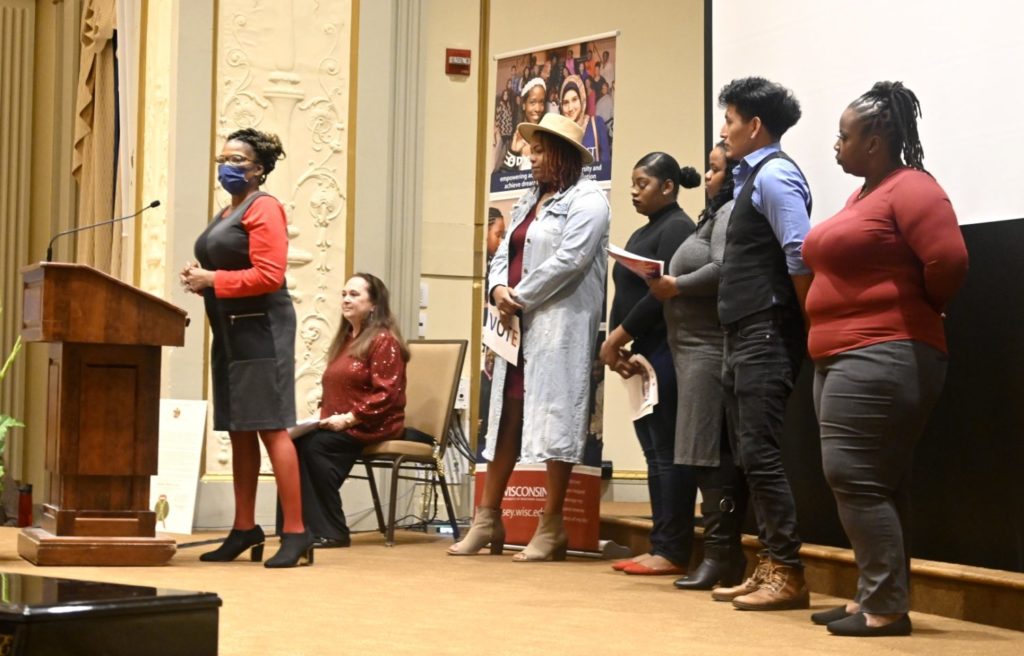
The potential for adults returning to school to reach goals of obtaining degrees and knowledge is often most affected by external factors that can make everyday life and returning to academics a difficult balance. The UW Odyssey Project is a remedy to that problem, and over their 20 years working to bring adults to higher education, they have gone the extra mile every time.
The Odyssey Project started in 2002 and quickly started changing lives. Acting as an avenue for adults to return to higher education through the resources and knowledge that run throughout UW-Madison has allowed the Odyssey Project to serve a plethora of people each year to achieve their academic, career, and personal goals. A celebration at the UW-Memorial Union was only fitting.
UW Odyssey Project co-director and founder Emily Auerbach hosted the night’s events at the Great Hall of the Memorial Union on Oct. 12. Auerbach reflected on their 20 years as an organization through their constant work to provide not only education, but also a community for returning students. The impact of the Odyssey Project was palpable as students from multiple different graduation years gathered to celebrate the growth and expansion of what led them to obtain their degrees.
The focal point of the night was fitting for the upcoming election cycle as former and current students spoke on the right and importance of voting. Current students Andrea White and Dominique Smith shared an amazing essay and poem on voting, respectively, while students from past years’ classes such as Brianna Johnson, Faleshuh Walker, and Char Braxton all shared moving poetic pieces on the civil liberty and the duty of voting. The night was also filled with music as songs celebrating Odyssey were performed and more speeches were given.
One of the people who spoke in celebration of The Odyssey Project’s “20 Years of Changing Lives” event was Corey Saffold who graduated in 2006. Saffold’s growth through the Odyssey Project led him to obtain a degree in criminology from Madison College and eventually become a senior police officer with the Madison Police Department. Since his time with the Odyssey Project, Saffold has been able to reflect on the changes that could have only occurred with the help and inspiration provided by the call to return to education.
“The Odyssey Project was quite the inspirational journey for me, and it was really that catapult that really pushed me and motivated me toward education,” Saffold told Madison365. “It placed a hunger in me, and being able to meet with a room full of other adults, who are all just hungry for education, was interesting.”
While it can be difficult to return to school after stepping away from academic spaces, it is part of the Odyssey Project’s mission to provide help however they can. Many difficulties manifest physically making it hard to attend class, but the mental barriers that prevent returning to school are something Saffold specifically spoke to Odyssey’s effectiveness in combating.
“When you think about the different physical and mental barriers that many people struggle with, the Odyssey Project slowly broke each barrier,” Saffold said. “If it was a physical barrier with food insecurities, needing help with utilities or childcare, and transportation. There was no physical reason or excuse that you could come up with for not attending class because they met every need. If there’s a need that they couldn’t meet, they figured out how to meet that need to insure you got the education.
“While you were in the class, you addressed those barriers in your mind of low confidence, feeling like you don’t have the ability, or feeling like higher education is not for you,” he continued. “Maybe you’re feeling like it’s too late for you. Those things when you’re in the classroom, going through the courses, going through the studies with other classmates, studying philosophy, and reading about social justice and learning about it, being a part of that is something that begins to really build you up as a person and motivate you to continue to use your voice.“

A major aspect of the experience of the Odyssey project is the attention to simple things like starting the afternoon class with a meal. These simple measures provide coverage for the responsibilities of adult life, and they also provide a point of connection for participants. Building bridges between students is another crucial component for the individual and collective success of those who come to learn.
“In the classroom itself, you build a community, and you begin to really care about the people in your classroom,” said Saffold. “You begin to learn about them and their families. Learning about what they care about and their passions. It gets to a point where everyone wants everyone to succeed and be successful in life. We’re all many ages, many different backgrounds, and coming from many different places who are coming together for a cause, which is a hunger for education. It’s interesting because you will meet people at a certain place in life, whether they struggle with certain fears or insecurities. You move from that place to being vulnerable and being transparent. It just became a safe environment to really trust each other with the things that you cared about.”
Odyssey has even taken the initiative to expand the opportunities they provide to those who it would best serve with programs like Odyssey Junior for children. Saffold’s daughter and grandson have graduated from Odyssey and Odyssey Junior. Other programs that have sprouted from the original Odyssey Project include Odyssey Beyond Bars for people who are imprisoned and Odyssey Beyond War to help refugees from countries in combat seek education. With the opportunity presenting itself, Saffold’s only advice for those on the fence when it comes to participating was to take a leap of faith.
“Don’t count yourself short,” Saffold advised. “And what I mean by that is, don’t put barriers in your own way. When I first applied for it, I had a chip on my shoulder like I don’t need this … but really I needed it. It was fear. Fear, if I could accomplish it, if I could do it, or what it would mean if I was a part of it. So I would tell that adult, don’t cut yourself short. Just at least go, just try it one time. Because I believe if they go that one time, they will be hooked on that first day.”
Odyssey’s branching out is indicative of what draws people to participate the most, meeting people where they are at. The Odyssey Project promises support if nothing else, but what else they have to offer is education as a tool and means to reach goals people may not even have thought possible.
“All of those are the layers of individuals that make it work,” said Saffold. “If you can find that supportive layer and then people who work there every day on another campus, then you can plant it there. You really need all those components for it to work … when you think about the number of resources it would take for that. With the holistic approach that they bring with making sure you get your education, from food to all the help that they provide, then doubling that, we really need our community to continue their support. The community has been very supportive, and for all the philanthropists, donors, and churches out there, from the grassroots levels to the levels of those individuals, corporations, companies, or businesses that can give substantially, and continue to give. And they continue to dig deep or increase giving, because it really does pay back, right.”
The need for support will only increase as The Odyssey Project looks to increase those who it can serve. Those who have the means can be assured that any help they provide to The Odyssey Project is going to make a life-changing difference for someone looking to improve their conditions by returning to academics. Saffold was positive that his own experience reflected the possibilities of the project, and that many of those who do the work are able to turn around and give back.
“The Odyssey Project really does pay back our community and our state,” Saffold assured. “You’re taking adults and you’re educating them, they’re going out into their field and are working. Many of these individuals are not leaving the state, many of them stay right here. What you have is, you’re increasing the professional workforce in a way that really invests back in society.”
To see more information on the Odyssey project and how you can get involved, check out their website here.



